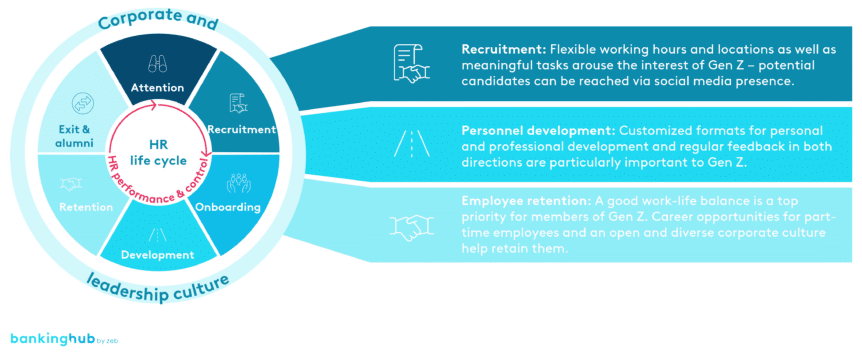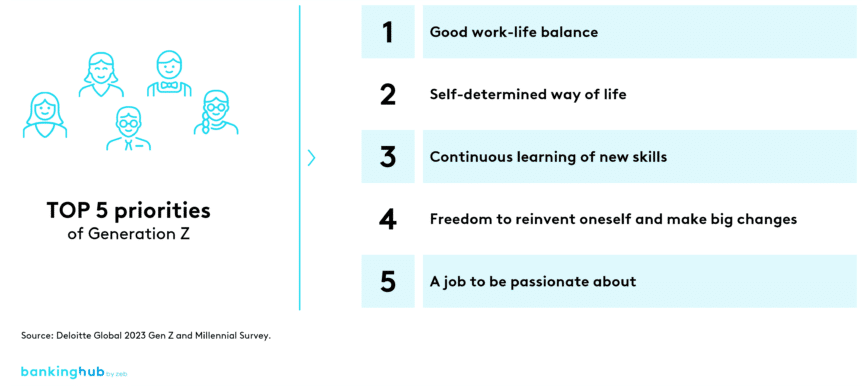Knowledge of the needs of young professionals more important than ever before
Roughly seven million – that is the number of workers that the German labor market will be short of by 2035 according to current forecasts.[1] Due to the increasing shortage of skilled workers and the resulting increased competitive pressure in the war for talent, companies have to put a much stronger focus on their own employer brand and the needs of their (future) employees.
The attractiveness of employers is consistently put to the test. The results of a trend survey in which over 20,000 young professionals participated gives cause for concern: Young talents are dissatisfied and more willing to change jobs than ever before. Around half of the respondents are actively looking for a new job, or at least keeping their eyes open for opportunities, while another 40% are generally open to changing jobs.[2] Understanding the needs and expectations of potential junior staff is therefore crucial to attracting, recruiting and, above all, retaining talented employees in the long term.
In this article, we will take a closer look at how the new generation should be contextualized and whether its demands really differ that much from those of previous generations.
BankingHub-Newsletter
Analyses, articles and interviews about trends & innovation in banking delivered right to your inbox every 2-3 weeks
"(Required)" indicates required fields
Generation Z – what are their characteristics and wishes?
When a company talks about young professionals, it is usually referring to the so-called Generation Z (Gen Z for short). Born between the mid-1990s and the early 2010s, more and more members of Gen Z have entered the labor market in recent years and have since been scrutinizing some of the supposedly unalterable practices of working life (e.g. rigid hierarchies or traditional working time models). The prejudices against Gen Z are many and varied, and yet they paint a common picture: for example, a well-known German online magazine published an article on Gen Z titled “Faul, arrogant und egoistisch?” (“Lazy, arrogant and selfish?”). But is it true that “young people” no longer want to work and are only concerned with their own needs?
If you take a look at the figures from the German Institute for Economic Research, at least the first part of the question is easily answered: No. Because people are working more hours than ever before. In 2023, all employees in Germany combined did almost 55 billion hours of work. In 2005, it was 47 billion hours.[3] Interviews with members of Gen Z corroborate what these figures are suggesting: for example, a global study was conducted, in which around 15,000 members of Gen Z were asked about various aspects of their private and working lives. Half of the respondents consider their work to be central to their identity.[4]
But what does that mean in concrete terms? Just like the generations before them, members of Gen Z attach great importance to work. What has changed is the role of work in the life of the individual, which is increasingly being called into question by young people. Ever more of them publicly advocate for a better work-life balance – which may further fuel the debate about the “lazy Gen Z” – and studies suggest that many members of Gen Z consider a good work-life balance the most crucial factor when it comes to choosing an employer.[5]
Apparently, only very few of them are impressed by classic status symbols such as successful careers, job titles or material possessions. Members of Gen Z strive for autonomy as well as personal and professional development. They want to constantly expand their horizons and be passionate about their jobs. They are unafraid of change, and way more willing to reinvent themselves time and again.
One could argue that many previous generations have wanted the same things. And that is a valid point! After all, the needs of the young generation are not new; the Gen Z-ers are just louder and more passionate when it comes to taking a stand for their cause. The current labor market and the increasing shortage of skilled workers are putting Gen Z in a strong negotiating position. they are well aware of that fact and making good use of it.
The new generation’s ever more present demands regarding the conditions of work are confronting companies with the challenge of rethinking their ways and scrutinizing supposedly tried and tested approaches. Successfully addressing young professionals is just the first step.
The solution: how companies can remain attractive
Below, we will take a brief look at each phase of the employee life cycle and show examples of the levers available to companies to attract, develop and, above all, retain young talent in the long term.
Recruiting
- Emphasize flexibility: companies should emphasize flexibility in terms of working hours and places of work to meet the needs of Gen Z.
- Offer meaningful work: emphasizing meaningful work and a company purpose that aligns with the values of the new generation can facilitate recruiting.
- Be quick and take unconventional paths: be where your potential candidates are – on social media. Short and concise job postings combined with short response times and lean application processes can arouse the interest of Gen Z.
Personnel development
- Offer individual development opportunities: companies should offer opportunities for individual development that account for the diverse interests and skills of Gen Z.
- Promote tech-savviness: leverage and actively foster the skills of Gen Z, who have grown up as digital natives. Moreover, the integration of digital learning platforms can make personnel development more attractive to young professionals.
- Establish feedback culture: a continuous feedback culture that promotes the exchange of constructive feedback between employees and their managers is crucial for the development of Gen Z – they want to be heard and understood.
Personnel retention
- Support work-life balance: establish programs and measures to support a healthy work-life balance. This not only makes you more attractive to young professionals, but is also beneficial to the health and well-being of your entire staff.
- Make career opportunities transparent: communicating clear career opportunities and development prospects can increase your (future) employees’ motivation and loyalty. A part-time career? That shouldn’t be a problem either.
- Cultivate your corporate culture: a positive and supportive corporate culture that promotes diversity, inclusion and employee commitment is crucial to retaining Gen Z employees in the long term.

The methods for employers to remain attractive to young talent are every bit as multifaceted as the generation itself. However, a holistic and strategic approach is of the essence for successfully overcoming the shortage of skilled workers in the long term. Feel free to contact us.








